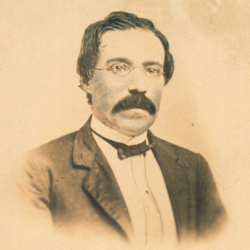
Rabbi Moritz Mayer (originally Moses Maier, later Maurice Mayer; 1821-1867) born in Dürckheim-on-the-Haardt, Germany, fled to the United States and to New York as a political refugee of the 1848 revolution. In 1859, after seven years as the rabbi of Ḳ.Ḳ. Beth Elohim in Charleston, South Carolina, he returned in poor health to New York where he contributed frequently to the Jewish press, and translated various German works into English: Rabbi Samuel Adler's catechism, Abraham Geiger's lectures on Jewish history, and Ludwig Philipson's pamphlet, Haben die Juden Jesum Gekreuzigt? (the Crucifixion from the Jewish Point of View), et al. In 1866, a number of his English translations of Fanny Neuda's teḥinot in German (from her Stunden Der Andacht, 1855/1858) were published in a volume he titled Hours of Devotion. The work also included a number of his own prayers as well as those of Marcus Heinrich Bresslau. The following year, Moritz Mayer passed away. He was 45 years old.
(We are indebted to Anton Hieke for his research on Mayer, "Rabbi Maurice Mayer: German Revolutionary, Charleston Reformer, and Anti-Abolitionist" published in Southern Jewish Life, 17 (2014), pp. 45-89.)
For Mayer's original prayers, please visit here.
Filter resources by Category
Filter resources by Tag
Filter resources by Collaborator Name
Filter resources by Language
Filter resources by Date Range
Resources filtered by COLLABORATOR: “Julia Watts Belser (translation)”
(clear filter)
Contributed by:
Julia Watts Belser (translation), Fanny Schmiedl-Neuda, Moritz Mayer (translation)
Fanny Neuda’s teḥinah for women experiencing difficulty conceiving children. . . .
Contributed by:
Wikisource Contributors (transcription), Julia Watts Belser (translation), Fanny Schmiedl-Neuda, Moritz Mayer (translation), Aharon N. Varady (transcription)
This is Fanny Neuda’s prayer “on Simḥat Torah,” faithfully transcribed and proofread with the help of German Wikisource contributors from Fanny Neuda’s Stunden Der Andacht (1855), p. 66-67. We are happy to share your translation of Neuda’s tkhines in any language. The translation provided here was made by Julia Watts Belser for Hours of Devotion: Fanny Neuda’s Book of Prayers for Jewish Women (ed. Dinah Berland, Schocken 2007), and set here for the first time side-by-side with Neuda’s original German. . . .

